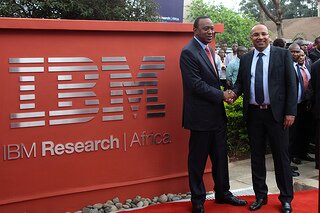
Kenya has been chosen as the cognitive hub of Africa, according to Dr Robert Morris, vice president (VP) of IBM’s Global Labs, saying what IBM is offering is a central point for the continent.
Cognitive computing involves discovery, decisions, understanding and assistance, with IBM planning to develop this through Project Lucy and its Watson supercomputer.
“Africa faces challenges such as cities, food, water, energy, e-government, healthcare, banking, and IBM Watson will marry cognitive computing and Africa’s problems for solutions,” said Morris.
The company is planning to use a three-tier model for this, involving appliance, cloud and cognitive hubs.
When IBM was starting out on Project Lucy the main focus areas were e-government, mobile money, human capacity development and smarter cities, but the focus has since shifted with an opportunity for helping Africa collect vast quantities of data about the workings of its economies and societies, as well as using Watson to discover insights in the data that could help break old patterns cropping up.
Currently, there are a number of projects in the field of education and healthcare, while a project is also underway to address the problem of drought as well as a financial inclusion project in conjunction with banks and telecoms to address inaccessibility to financial services.

















